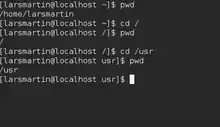 The pwd command | |
| Original author(s) | AT&T Bell Laboratories |
|---|---|
| Developer(s) | Various open-source and commercial developers |
| Initial release | June 1974 |
| Written in | C |
| Operating system | Multics, Unix, Unix-like, V, Plan 9, Inferno, SpartaDOS X, PANOS, Windows CE, KolibriOS |
| Platform | Cross-platform |
| Type | Command |
| License | coreutils: GPLv3+ Plan 9: MIT License |
In Unix-like and some other operating systems, the pwd command (print working directory)[1][2][3] writes the full pathname of the current working directory to the standard output.[4][5][6][7][8][9][10]
Implementations
Multics had a pwd command (which was a short name of the print_wdir command)[11] from which the Unix pwd command originated.[12] The command is a shell builtin in most Unix shells such as Bourne shell, ash, bash, ksh, and zsh. It can be implemented easily with the POSIX C functions getcwd() or getwd().
It is also available in the operating systems SpartaDOS X,[13] PANOS,[14] and KolibriOS.[15] The equivalent on DOS (COMMAND.COM) and Microsoft Windows (cmd.exe) is the cd command with no arguments. Windows PowerShell provides the equivalent Get-Location cmdlet with the standard aliases gl and pwd.
On Windows CE 5.0, the cmd.exe Command Processor Shell includes the pwd command.[16]
pwd as found on Unix systems is part of the X/Open Portability Guide since issue 2 of 1987. It was inherited into the first version of POSIX.1 and the Single Unix Specification.[17] It appeared in Version 5 Unix.[18] The version of pwd bundled in GNU coreutils was written by Jim Meyering.[19]
The numerical computing environments MATLAB and GNU Octave include a pwd
function with similar functionality.[20][21] The OpenVMS equivalent is show default.
*nix examples
Command | Explanation |
|---|---|
pwd | Display the current working directory. Example: /home/foobar |
pwd -P | Display the current working directory physical path - without symbolic link name, if any. Example: If standing in a dir /home/symlinked, that is a symlink to /home/realdir, this would show /home/realdir |
pwd -L | Display the current working directory logical path - with symbolic link name, if any. Example: If standing in a dir /home/symlinked, that is a symlink to /home/realdir, this would show /home/symlinked |
Note: POSIX requires that the default behavior be as if the -L switch were provided.
Working directory shell variables
POSIX shells set the following environment variables while using the cd command:[22]
- OLDPWD
- The previous working directory (as set by the cd command).
- PWD
- The current working directory (as set by the cd command).
See also
- Breadcrumb (navigation), an alternative way of displaying the work directory
- List of GNU Core Utilities commands
- List of Unix commands
pushdandpopd
References
- ↑ "pwd(1) [minix man page]". www.unix.com.
- ↑ "pwd - print name of current/working directory - man page". www.mankier.com.
- ↑ "GNU Coreutils". www.gnu.org.
- ↑ Unix Time-Sharing System: Unix Programmer's Manual (PDF). Vol. 1 (7th ed.). Bell labs. January 1979. p. 142. Archived from the original (PDF) on 2005-05-20.
- ↑ "pwd(1) [plan9 man page]". www.unix.com.
- ↑ "pwd". pubs.opengroup.org.
- ↑ "pwd(1) [osf1 man page]". www.unix.com.
- ↑ "Apple OS X MAN page".
- ↑ "pwd(1) - OpenBSD manual pages". man.openbsd.org.
- ↑ "pwd(1) [opensolaris man page]". www.unix.com.
- ↑ "working_dir, wd, print_wdir, pwd (Multics help segment)". MIT. Retrieved 7 March 2020.
- ↑ Van Vleck, Tom. "Unix and Multics". Multicians.org. Retrieved 7 March 2020.
- ↑ "SpartaDOS X 4.48 User Guide" (PDF).
- ↑ "Chris's Acorns: Panos". chrisacorns.computinghistory.org.uk.
- ↑ "Shell - KolibriOS wiki". wiki.kolibrios.org.
- ↑ "Command Processor Commands (Windows CE 5.0)". docs.microsoft.com.
- ↑ – Shell and Utilities Reference, The Single UNIX Specification, Version 4 from The Open Group
- ↑ – FreeBSD General Commands Manual
- ↑ – Linux User Manual – User Commands
- ↑ "Identify current folder - MATLAB pwd". www.mathworks.com.
- ↑ "Function Reference: pwd". octave.sourceforge.io.
- ↑ "cd". pubs.opengroup.org.
Further reading
- McElhearn, Kirk (2006). The Mac OS X Command Line: Unix Under the Hood. John Wiley & Sons. ISBN 978-0470113851.
External links
- – Shell and Utilities Reference, The Single UNIX Specification, Version 4 from The Open Group
- – FreeBSD General Commands Manual
- – NetBSD General Commands Manual
- – OpenBSD General Commands Manual
- – Solaris 11.4 User Commands Reference Manual
- – Linux User Manual – User Commands
- – Plan 9 Programmer's Manual, Volume 1
- – Inferno General commands Manual